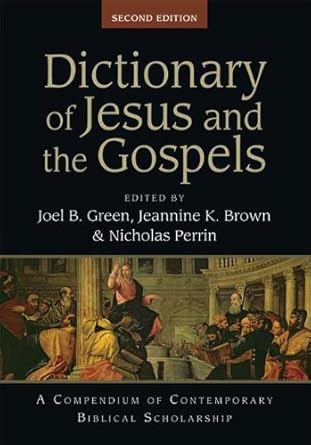
You know you're getting on a bit when you are excited about a complete revision and expansion of a book you bought in its first edition over 20 years ago, and have used regularly and gladly all that time. Generations of theological students and pastors keen to do their own exegetical digging have benefited from the IVP black dictionaries on the New and Old Testaments. The Dictionary of the OT Prophets was published a year or two ago completing the full set of Black Dictionaries. The Dictionary of Jesus and the Gospels was published 21 years ago, and now needs updating and made consistent with the rest of the set. I guess what we have is a changing continuity with this project, aiming to keep the scholarship current – and for that IVP are to be congratulated.
I've used every one of the IVP Black Dictionaries frequently, profitably and I can think of fewer big volumes that are such value for money. They have well conceived subject indices at the back making it possible to pursue obscure or minor themes through the lens of the major articles. The Jesus and the Gospels volume has a detailed index of gospel texts allowing for further chasing of exegetical detail (a full scripture index would be much too cumbersome).
The pre-publication description on Amazon shows the scope and quality of what is on offer. No I haven't seen the revised edition. It has almost the same number of pages, but as you'll see from the pre-pub. extract below, it is almost entirely a new book:
How can undergraduate students, seminarians, people in professional
ministry, leaders in local churches and other Christian organizations,
even academic scholars, stay abreast of the range of contemporary study
of Jesus and the Gospels? How can the fruit of vital study of Jesus and
the Gospels in recent years help to animate our reading of and
interaction with the Gospels?
When it first appeared some twenty
years ago, the 'Dictionary of Jesus and the Gospels' was concerned to
address exactly these kinds of needs. This revision of the Dictionary
follows the same path, though now with new content and up-to-date
bibliographies, as well as a host of new contributors. Some ninety
percent of the original material has been replaced, with most previous
entries assigned to a fresh list of scholars. A number of new articles
have been introduced, and a handful of articles from the first edition
have been updated in light of ongoing research.
I await the arrival of the second generation of this Dictionary with impatience. What will I do with the old one – well what do you do with old friends? You don't sell them, recycle them, dump them or pulp them! You look after them, you find space for them, and if you can find a caring home for them, that would be good!